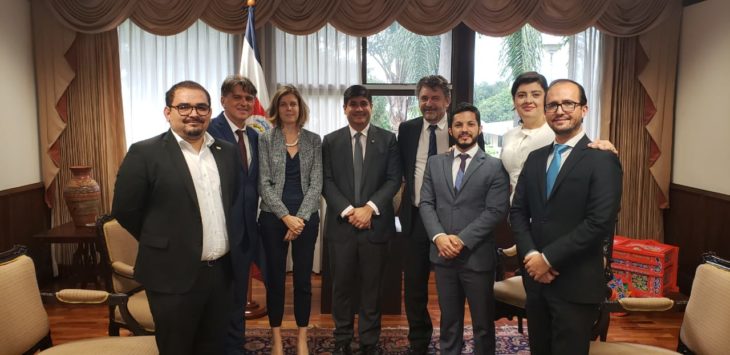The working meeting was also attended by the Costa Rican Ministers for National Planning and Economic Policy and Human Development and Social Inclusion as well as the EU’s in-country delegation.

Costa Rica’s president, Carlos Alvarado, received a joint EUROsociAL+ Programme and European Union delegation in Costa Rica to move the support for the strengthening of the institutional and social agenda in the Central American country forward. This meeting was also attended by the Minister for National Planning and Economic Policy, Pilar Garrido, the Minister and Deputy Minister for Human Development and Social Inclusion, Juan Luis Bermúdez and Francisco Delgado, and the Deputy Minister for Employment and Social Security, Luis Aguilar.
The Government of Costa Rica is sponsoring the establishment of a flexible and robust governance model that allows for greater administrative efficiency and the definition of a cohesive and coherent social policy. This is a priority action for the Government of Costa Rica, which is being put before the EUROsociAL+ Programme by that country’s Ministers for National Planning and Economic Policy and for Human Development and Social Inclusion.
This working meeting also formed part of the third mission conducted by the specialist consultancy expert Fabián Repetto aimed at consolidating the mechanism for reconciliation between players and contributing to strategically influencing the preparation of the draft law.
During previous missions, the Costa Rican Ministry for Human Development and Social Inclusion received advice regarding the design and approval of a new stewardship of the social sector, the formation of human development and social inclusion policies in the country and the onset of dialogue with national institutions, all in line with the path being planned by the Government of Costa Rica, with respect to which the following steps have been fulfilled: i) establishing a methodology, in the form of a strategic road map, to move towards what could be called “ formal dialogues ”with the set of institutions directly involved in what will be the new bill; ii) moving forward in an exhaustive analysis of the first draft of the bill that resulted in a rapid reformulation thereof in a second draft; and iii) consolidating the advisory role for specific aspects related to the process.



